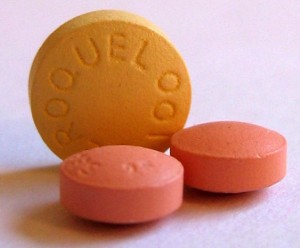Kickbacks and Questionable Studies- How AstraZeneca Turned a Bipolar Drug into a Cure All
 A landmark victory was won against manipulative drug makers last week when the U.S. government reached a $520 million settlement with AstraZeneca over their use of illegal marketing and off-label use of the atypical antipsychotic drug, Seroquel.
A landmark victory was won against manipulative drug makers last week when the U.S. government reached a $520 million settlement with AstraZeneca over their use of illegal marketing and off-label use of the atypical antipsychotic drug, Seroquel.
Among the allegations in the lawsuit are charges that AstraZeneca paid kickbacks to doctors to write “scientific” articles to back up their claims that the drug could be used for a number of different conditions including insomnia and much more. They are also accused of flying doctors to resorts so they could discuss different ways to recommend the drug for conditions outside of its approved uses.
I don’t know about you, but I find it hard to believe that an antipsychotic drug can also double as a cure for insomnia. Sure, it will probably knock you out for the night, but the side effects are most likely going to be a little far-reaching than eating a whole birthday cake in your sleep. (I am talking to you Ambien)
The Government Steps In
AstraZeneca settled out of court citing their desire to avoid a long, drawn out legal process. I for one am not buying it. It appears, from the outside, to be a move they made to avoid having all of their dirty laundry aired out in the open over the course of a drawn out court battle that they obviously know they can’t win.
In 2009, during one of the worst economic depressions in our country’s history, the drug maker made $4.9 billion off of Seroquel. That makes it their SECOND best seller. Even with profits like that, $520 million isn’t a drop in the bucket. If $520 million is what it takes to deter practices like these, then that’s just precisely the type of number that needs to be leveled against the AstraZeneca’s of the world.
The storm isn’t over for AstraZeneca either.
A class action lawsuit has been filed against them by patients who have reason to believe that they have developed diabetes as an undisclosed side effect of using their drug. The lawsuit claims that not only did AstraZeneca know about the awful side effect, but that they even included warnings of it on the Japanese labels of the drug.
That’s right.
They allegedly knew that the drug could cause diabetes and made the decision not to mention it to potential users.
Can you imagine being prescribed an antipsychotic drug for insomnia, and then find out that you may have developed diabetes from it?
 Even Greater than $520 Million
Even Greater than $520 Million
The biggest win from this case has nothing to do with ANY amount of money, but more for the fact that it is bringing the off label use of prescription meds to the forefront of the pharmaceutical debate.
Although the Food and Drug Administration approves drugs for specific uses, it is up to the doctor’s discretion to use the medications as they see fit. That means doctors are free to prescribe drugs, such as Seroquel, for any number of uses other than what it was designed to do. You are basically a lab rat at that point.
You will notice that one of the allegations in the suit is that they were illegally marketing their product. While it is illegal for drug makers to overtly market drugs for off label use, salespeople can inform doctors of studies that show other uses of the drugs. This loophole has left the door wide open for some creativity on the drug maker’s part.
Take the AstraZeneca case for instance. They knew that they couldn’t come out and market their drug as a cure for insomnia, but what they could do was provide doctors with studies that show all of the different off-label uses for Seroquel.
This is where the resorts and kickbacks came into play. They were paying doctors to conduct studies on the drug under the guise of legitimate research. In actuality, AstraZeneca was controlling the studies, so of course they were going to find other uses for their drug. They were literally paying for proof that their drug did whatever they wanted it to do.
It makes you wonder how much of that $4.9 billion is thanks to off label prescriptions.
Sadly, there are millions of people in the U.S. that rely on companies like AstraZeneca for the medications they need, and to think that they might be using you as a human guinea pig, for financial gain, is unsettling at the least. The only way to force safe and legal practices upon companies like AstraZeneca is to take advantage of the court system and finally hold them accountable for their dangerous and greedy actions.
In the meantime, I would strongly suggest diligently researching any drug that has been prescribed to you. Have any of you had a similar experience? Have you been prescribed Seroquel or any other drugs for off label use? Please, feel free to share your thoughts.
Category: In Depth






